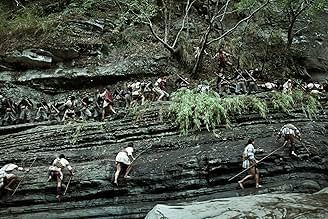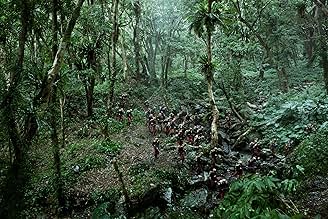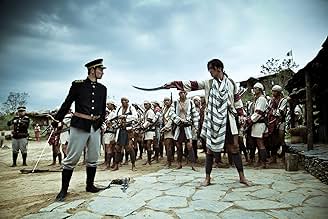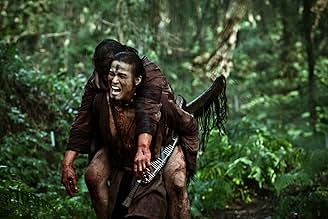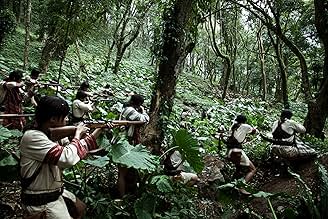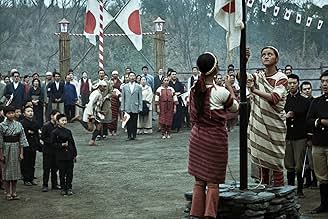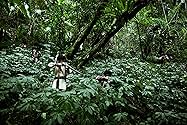IMDb-BEWERTUNG
7,5/10
7495
IHRE BEWERTUNG
Bildgewaltige Aufarbeitung einer wenig bekannten Episode aus der jüngeren Geschichte Taiwans.Bildgewaltige Aufarbeitung einer wenig bekannten Episode aus der jüngeren Geschichte Taiwans.Bildgewaltige Aufarbeitung einer wenig bekannten Episode aus der jüngeren Geschichte Taiwans.
- Auszeichnungen
- 15 Gewinne & 29 Nominierungen insgesamt
Nolay Piho
- Mona Rudao
- (as Lin Ching-tai)
Pawan Neyung
- Baso Mona (Mona's Younger Son)
- (as Lee Shih-chia)
Yi-Fan Hsu
- Ichiro Hanaoka aka Dakis Nomin
- (as Bokeh Kosang)
Empfohlene Bewertungen
An excellent movie: historical, good action, realistic, in the beautiful nature of the Republic of China, where one learns the raw violence of the eastern races, greater than that of the West.
Wei Te-Sheng had this movie planned way before his hit movie "Cape No.7" which was a big hit. And his efforts really shows in this movie, it's basically a high budget epic from taiwan that is most definitely worth watching. On the exterior it might seem like another historical movie about Japanese occupation and invasion and how they mistreated, enslaved and also raped the people on the land they invaded. While also taking away their tradition, culture, language and freedom. Thus making the people rise up and throw a rebellion and fight the Japanese for justice, pride and freedom. But this movie has a lot of interior elements as well. It really does a good job of now going down a narrow rebellion movie but brings out the scars, the harshness and manly pride. Some scenes are uncomfortable to see but it shows the brutality and the length the rebels are willing to go. The movie takes place in taiwan during the 1895 and 1945 on a land where two tribes use to fight each other. but what happens when a more menacing enemy comes to enslave all of them? This movie is simply very well crafted with good pacing and editing. Wei Te-Sheng seems like a talented director and I am grateful that his vision his got from a comic book came to life on the big screen. This feels kind of like a taiwanese version of the movie "300" except with more substance and emotion with scars going for it. Highly recommended to anyone that enjoys historical movies with some realistic guerrilla battle tactics.
8.2/10
8.2/10
I walked out of the cinema with both surprise and worry. I'm worried because maybe this is not a very good film, especially not a good "commercial film" to make both ends meet, but I'm really glad to see that Te-Sheng Wei can still insist on his idea even in such a big production.
Before going to the theater, my first concern was whether it would become a stereotypical nationalism or humanism film, because The Wushe Incident had been represented so many times in our history class in Taiwan that it seemed to be too difficult to make this film without compromising on political correctness, but Te-Sheng Wei made it!
Sàidékè balái presented a mass of killing and death, not in a humanism or Han Chinese Nationalism way, but from the aspect of the Seediq. I have heard people arguing if it is necessary to have so much violence in this film, but I have to say that the value of peace or anti-war is the main stream nowadays but not so to the traditional Seediq that time. Therefore, I think the director is not a moral relativist, he just chose not to judge the past with today's value, and resisted the mainstream that drowned the voice of the minority.
It impressed me that there was little Chinese or Taiwanese through out this film. Instead, the film is composed of Seediq language and Japanese. We should cherish it that 80 years after the The Wushe Incident, we can finally see a film which represents historical event not based on the authority opinion but on people who didn't lead the history, i.e. the native.
Before going to the theater, my first concern was whether it would become a stereotypical nationalism or humanism film, because The Wushe Incident had been represented so many times in our history class in Taiwan that it seemed to be too difficult to make this film without compromising on political correctness, but Te-Sheng Wei made it!
Sàidékè balái presented a mass of killing and death, not in a humanism or Han Chinese Nationalism way, but from the aspect of the Seediq. I have heard people arguing if it is necessary to have so much violence in this film, but I have to say that the value of peace or anti-war is the main stream nowadays but not so to the traditional Seediq that time. Therefore, I think the director is not a moral relativist, he just chose not to judge the past with today's value, and resisted the mainstream that drowned the voice of the minority.
It impressed me that there was little Chinese or Taiwanese through out this film. Instead, the film is composed of Seediq language and Japanese. We should cherish it that 80 years after the The Wushe Incident, we can finally see a film which represents historical event not based on the authority opinion but on people who didn't lead the history, i.e. the native.
then try to watch this 'Warriors of The Rainbow', and tell me if you could spot the similarities of these two movies. The invasion of the British soldiers to north America vs the Japanese soldiers invaded Taiwan; then there's a great fighter among the Mohicans warriors on par with a ferocious fighter among the Taiwanese aboriginal tribes; then again, the Mohicans got feudal sworn enemy of another tribe to the similar feud of two Taiwanese aboriginal tribes....Then when i watched this movie, i suddenly realized that the whole picture is more like when the American forces invaded Iraq, there were tribes to become the collaborators helping Americans and using them to help killed their own feudal enemies... But this is the first time that I felt this movie was a very mature production since I never found anything like it out of Taiwan. Because usually, all movies from Taiwan, the dialogs were disgustingly embarrassing feminine, males whining like females. Yet this movie is absolutely masculine and this is first time that I felt the male population in Taiwan sounded and acted more like man, not just whiners. Furthermore, this is also the first time that I consider this movie is at a higher international level with great acting, directing and cinematographic achievement. And this is very rare to me and totally win my respect back to the Taiwanese movie industry. Salute!
One of Taiwan's biggest ever films today, probably the most expensive ever made and looks set to be the highest earning to date. The story of Seediq Bale, based on the Wushe Incident is split into two segments, the first being entitled The Sun Flag (tai-yang qi) and the second, The Rainbow Bridge (cai-hong qiao). Seediq Bale is the best looking Taiwanese production to date, it seems on par with the majority of action films coming straight out of Hollywood. The battle scenes are impressive, they're fast paced with a lot of of excitement and thrills, there's explosions, blood splatters and much like you'd expect from headhunters, there's a few heads rolling.
Story: The story moves quickly despite the movie being close to 2 and a half hours long. There is a small bit of background and lead up to the Japanese arriving but not a great deal. When the Japanese arrive it also doesn't seem that much happens in the story, it doesn't give you complex characters or anything you must grasp or understand. It's a simple story but flows well and entertains.
Characters: Character building and general development is a problem in this movie, although it is entertaining with no boredom from start to finish it doesn't have much depth to it. You must take the characters on face value as you don't really get a sense of who they are. There is one character who can be classed as the lead but you even don't get to know who he is. Throughout the movie you're introduced to numerous characters, both on the aboriginal side and the Japanese side, yet you don't get to know more than the basics of who they are.
Directing: Te-Sheng Wei has previous had a bit hit in Taiwan with Cape No.7 which guaranteed him the funding for this movie. But still his style is not flawless, at times he comes across as still being an amateur with some very strange shots and some even more bizarre cuts. More than one scene had him building up, suspense and emotion was all there and then he suddenly cuts to something completely different. It kills the feeling but also provides a kind of shock.
Also its probably worth having a little background on headhunting traditions before watching this film, without understanding about their culture at times you might just find yourself rooting for the Japanese side.
Overall: I thoroughly enjoyed this movie, sure it could've been better but at the same time it could've been a lot worse. It's receiving a lot of praise in Taiwan with this movie smashing records and the follow up looking set to break even more. One things for sure, I'll be booking my tickets for the second instalment.
Story: The story moves quickly despite the movie being close to 2 and a half hours long. There is a small bit of background and lead up to the Japanese arriving but not a great deal. When the Japanese arrive it also doesn't seem that much happens in the story, it doesn't give you complex characters or anything you must grasp or understand. It's a simple story but flows well and entertains.
Characters: Character building and general development is a problem in this movie, although it is entertaining with no boredom from start to finish it doesn't have much depth to it. You must take the characters on face value as you don't really get a sense of who they are. There is one character who can be classed as the lead but you even don't get to know who he is. Throughout the movie you're introduced to numerous characters, both on the aboriginal side and the Japanese side, yet you don't get to know more than the basics of who they are.
Directing: Te-Sheng Wei has previous had a bit hit in Taiwan with Cape No.7 which guaranteed him the funding for this movie. But still his style is not flawless, at times he comes across as still being an amateur with some very strange shots and some even more bizarre cuts. More than one scene had him building up, suspense and emotion was all there and then he suddenly cuts to something completely different. It kills the feeling but also provides a kind of shock.
Also its probably worth having a little background on headhunting traditions before watching this film, without understanding about their culture at times you might just find yourself rooting for the Japanese side.
Overall: I thoroughly enjoyed this movie, sure it could've been better but at the same time it could've been a lot worse. It's receiving a lot of praise in Taiwan with this movie smashing records and the follow up looking set to break even more. One things for sure, I'll be booking my tickets for the second instalment.
Wusstest du schon
- WissenswertesTaiwan's official submission to the Best Foreign Language Film category of the 84th Academy Awards 2012. To meet Academy regulations, the four-and-half-hour full version of the diptych was submitted as one entry.
- Zitate
Mona Rudao: There are more Japanese people than the tree leaves in the forest, than the pebbles in Jhuoshuei River. But my determination to fight them is more adamant than Mt. Chilai! If your civilization wants us to cringe, I'll show you the pride of savages!
- VerbindungenFollowed by Sai de ke · ba lai: Cai hong qiao (2011)
Top-Auswahl
Melde dich zum Bewerten an und greife auf die Watchlist für personalisierte Empfehlungen zu.
- How long is Warriors of the Rainbow: Seediq Bale I?Powered by Alexa
Details
- Erscheinungsdatum
- Herkunftsland
- Offizielle Standorte
- Sprachen
- Auch bekannt als
- Warriors of the Rainbow: Seediq Bale I
- Produktionsfirmen
- Weitere beteiligte Unternehmen bei IMDbPro anzeigen
Box Office
- Budget
- 23.000.000 $ (geschätzt)
- Bruttoertrag in den USA und Kanada
- 136.166 $
- Eröffnungswochenende in den USA und in Kanada
- 57.183 $
- 29. Apr. 2012
- Weltweiter Bruttoertrag
- 4.670.432 $
- Laufzeit
- 2 Std. 24 Min.(144 min)
- Farbe
- Seitenverhältnis
- 2.35 : 1
Zu dieser Seite beitragen
Bearbeitung vorschlagen oder fehlenden Inhalt hinzufügen


